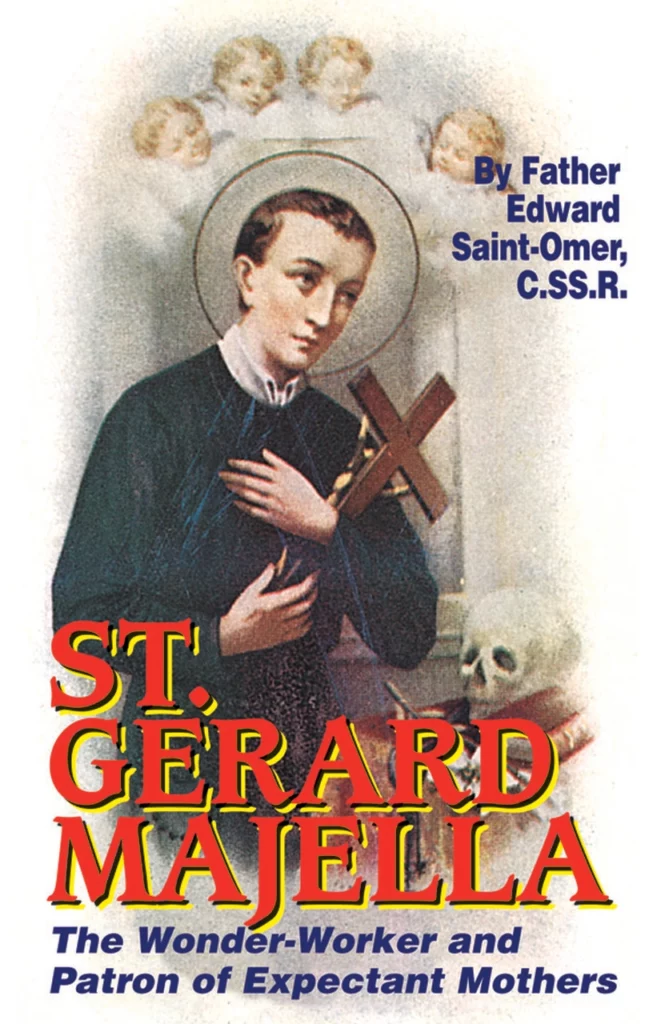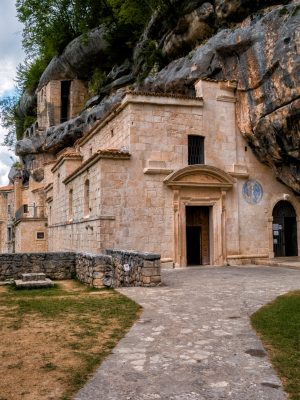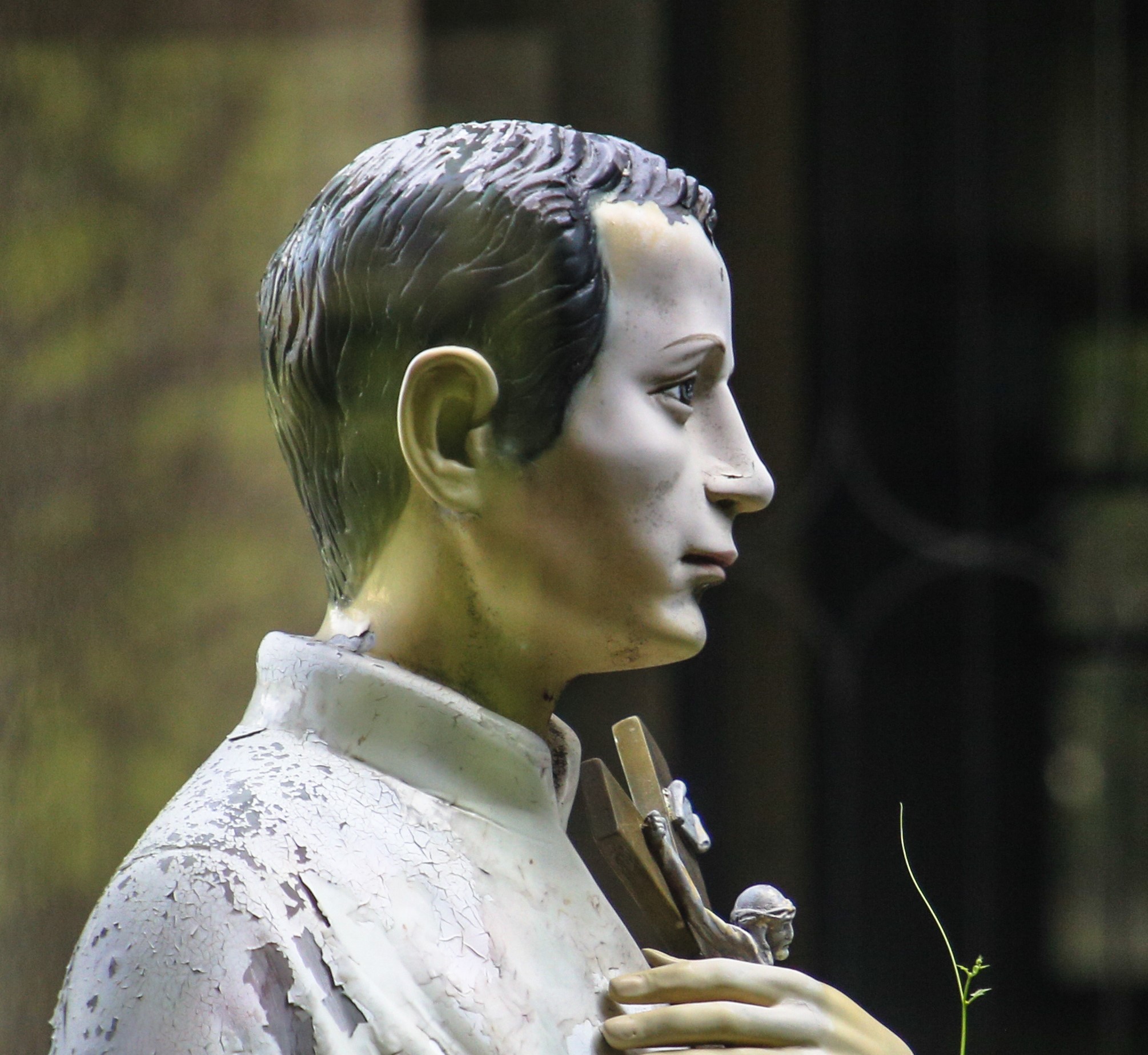To love Jesus Christ is to love the souls redeemed by the Blood of Jesus Christ. We can, then, judge of Gerard’s zeal for the salvation of souls by the seraphic ardor that consumed him for our Divine Saviour. In his resolutions, we read the following beautiful words:
“O my God, may I convert as many sinners, if they exist, as there are grains of sand on the earth, drops of water in the ocean, leaves on the trees and stars in the firmament! I desire that all my prayers, Communions and good works may contribute to the conversion of poor sinners, and for that end I offer to God my life with the Precious Blood of Jesus Christ.”
At the sight of the wonders of his zeal, his companions knew not how to express their admiration. “When he arrived in any place,” they tell us, “his visit was equal to a mission. His presence was equivalent to that of several missionaries.” “Astonishing thing!” exclaimed Father Cafaro; “wherever that brother goes, he rouses the whole country.” “I have heard,” wrote the Bishop of Melfi, “the great things he has done at Corato. I see more clearly than ever that Gerard is really a Saint, and I want to have him.”
His appearance, the mere sight of him, say witnesses, was a sermon. One felt God in him. His burning words aroused in souls horror for sin, ardor for prayer, the love of Jesus and Mary and fidelity to the duties of their state. His good example, his prayers, his exhortations and his penances contributed greatly to the success of the Missions. Gerard possessed special tact for inculcating the holy love of God and works of piety in children.
His lessons remained forever engraved on their young souls. He had the habit of ending his lessons with the words: “So it is understood, we give ourselves entirely to the good God.” Then, giving to every one a picture, or making the Sign of the Cross on the forehead, he sent them away full of joy to their parents. He knew no greater happiness than to instruct the poor, the sick and souls most abandoned. It was sufficient to be poor, sick or miserable to receive from him the most sincere marks of tenderness. There exhaled from his person something divine, I know not what, which comforted hearts, cured souls and attracted them to virtue.
Although he was not a priest and consequently did not exercise the ministry of preaching, he had received from God a heavenly talent for the conversion of sinners. Father Tannoia, who had lived with him, said: “In all the missions at which Gerard assisted in the service of the priests, he effected numberless conversions. He kept the missionaries busy absolving penitents whom he in his humility had disposed for the Sacrament. Sometimes he used to say: ‘I am sending you a big fish, and I hope it will not be disagreeable to you.’ ” That writer did not hesitate to call him “a hunter of souls—a hunter who had his eye always fixed on some prey for Jesus Christ.”
To reach his ends, he used neither stratagem nor roundabout ways. He attacked vice boldly, weapon in hand. Sometimes, he sought in their own homes those that he wished to convert; sometimes, urged by an interior movement of the Holy Ghost, he would wait for them in the public street and insinuate himself into their heart in order to acquire the right to penetrate into their conscience. When he had succeeded in touching them, he showed them the sad state of their souls and ended by gaining them to Jesus Christ. When gentleness failed, he assumed a stern manner. He knew how to terrify the sinner by the tone of his voice. It was a common saying that he had only to cast his eyes on a sinner to lead him to penance. A great prelate once said, “It is God who speaks by his lips.”
The conversion of a soul was the only treasure he sought. One day, when returning from a journey, he met at a short distance from Iliceto an adventurer who, noticing his shabby mantle, cassock and hat, took him for a magician. He said to him: “If you are looking for a treasure, here it is, ready to go with you and help you.” “But,” responded Gerard, “are you a man of courage?” “Ah!” answered the wretched man, “You do not know who I am! I will tell you.” Thereupon he recounted his sad life, adding that for many years, he had lived far from the Sacraments. “Indeed,” said Gerard, “I am going then to hunt a treasure for you. This has been a happy meeting for me. The treasure is as good as found.”
They entered together the wood that lay on their route. When they had reached a densely shaded spot, Gerard mysteriously spread his mantle on the ground, and making the sinner kneel on it, his hands joined, he thus addressed him: “I have promised you a treasure, and I am going to keep my word,” and he held up his Crucifix. “Behold,” said he, “the treasure that you have lost for so many years!” Then he depicted the sad state of the man’s poor soul and urged him to return to God. The sinner, touched by grace, began to weep, thanking God that he had permitted him to meet a Saint.
Needless to say, he went forthwith to lay the burden of his sins at the feet of a confessor in our church of Iliceto. “I would give my life a thousand times,” said Gerard, “that God might not be offended.” Sin of whatever kind froze him with horror, but of all sins, blasphemy was one of the most revolting to him. One day at Bovino he heard a carter blaspheming like a demon because his team could not disengage themselves from a rut in the road. “Unhappy man! Stop blaspheming,” cried the holy brother in a voice of thunder.
“Yes, I will stop,” retorted the other, “if you get my wagon out of this rut. My mules will be killed.” Then Gerard, making the Sign of the Cross over the beasts, addressed them: “Creatures of God, in the name of the Most Holy Trinity, I order you to go on!” Instantly the team began to move and soon cleared the muddy rut. After remonstrating with the blasphemer, Gerard gave him his handkerchief, promising that under similar circumstances, by throwing it on the wagon, Heaven would come to his aid. The muleteer made happy experience of this promise.
Gerard abhorred injustice. One day he was having his horse shod by a farrier of San Menna. When the work was finished, the smith demanded exorbitant pay. The brother, incensed at the injustice, ordered his beast to give back the shoes. Instantly the animal shook his legs, and the shoes fell to the ground. As for Gerard, he went on his way, to the great amazement of the smith, who called him back, but in vain. Another sin that deeply wounded the heart of the pious Redemptorist was sacrilege. He would have wished to extirpate it from the world. Jesus Christ favored the holy zeal that devoured him by revealing to him the secrets of consciences. A woman named Teresa Morante wished one day in Gerard’s presence to make a show of sanctity, which she was far from possessing. The brother listened in silence to her beautiful words of piety.
When she had finished, he said to her in a grave tone: “My daughter, why do you want to make me believe that? For years you have made sacrilegious Confessions and Communions, and now you are playing the Saint. Go make a good Confession, if you would not be damned.” The woman, exceedingly abashed, went and threw herself at the feet of Canon Rossi, to whom she acknowledged that for ten years she had through shame been living in sacrilege. Then she made a general Confession with such contrition that she desired her sins to be made public in the biography of the holy brother to whom she owed her conversion.
A man of good position also had lived for years in sacrilege. Being alone with him one day, Gerard thus addressed him: “My son, you are living in sin. Do you wish to die a reprobate? Confess the sin that you have for so long hidden and return to the grace of God.” These words were sufficient. The sinner put an end to his profanations. An unfortunate woman was in the same dreadful state. “Dear sister,” said Gerard to her one day, “how can you be at peace while living in disgrace with God? Why do you not confess that sin which you have passed over in silence for so many years?” Stupefied at the revelation, the sinner hastened to make a humble avowal of the state of her conscience. Seeing a young girl leaving the church one day, the servant of God addressed her. “For what did you come here?” he asked. “To go to Confession,” she answered. “I know,” replied Gerard, “but you have not made a good Confession.” Then he told her the sins that shame had led her to hide from the confessor. The poor girl, very much taken aback, returned immediately and was reconciled to God.
Gerard’s zeal knew no bounds when there was a question of a sinner at the moment of death. A man named Liguoro was attacked by a sudden sickness which reduced him to the last extremity. For many years, he had not fulfilled the duties of religion. Seeing him at the point of death, his afflicted family implored Gerard to come quickly to the dying man. The zealous Redemptorist arrived without delay and, like another Elias, placed his mouth on that of the sick man. At the same instant the latter returned to consciousness and in the most Christian manner received the Last Sacraments. What zeal the holy brother employed for the reconciliation of enemies!
A notary of Castelgrande had in a dispute killed the son of a man named Marco Carusi. The family of the victim conceived implacable hatred against the murderer, and every effort to reconcile them was unavailing. As this enmity might have fatal consequences, it was resolved to employ Brother Gerard’s mediation. The servant of God first had a private interview with Marco, who was so impressed by the words of charity which came straight from his heart that he showed himself disposed to trample underfoot every desire of revenge. In the meantime, the holy brother was obliged to go to Muro for several days. On his return, he found his work undone. Hell had made use of the mother of the victim to rekindle the flame. When the subject of reconciliation was broached, the wife flew into a violent rage, ran to her husband, loading him with a thousand imprecations and, seizing the blood-stained garments of her murdered son, threw them in his face. “Look!” she cried with fury, “look at these bloody garments, and then go and be reconciled if you can.”
These words roused in the husband’s heart hatred stronger than ever. When Gerard heard of it, he exclaimed: “No, no! Hell shall not triumph! God will have the victory!” Going to Carusi’s house, crucifix in hand, he addressed the couple: “Come, come, tread underfoot this crucifix! Come on, tread underfoot the image of Him who pardoned His executioners. . . . You must pardon! When I first came here, it was in obedience to the call of man, but it is God Himself who sends me today. Listen, father and mother, who refuse to pardon! Your son is in Purgatory, and there he will remain as long as your resentment lasts.
If you wish to deliver him, you must first be reconciled and then have five Masses celebrated for the repose of his soul. This is all that I have to say to you on the part of God. If you refuse, the most terrible chastisements await you.” At these burning words the parents, conquered, exclaimed: “Yes, yes, we will forgive!” From that day, the two families were reconciled and, what is more wonderful, vowed sincere friendship.
This article is taken from a chapter in St. Gerard Majella which is available from TAN Books.









